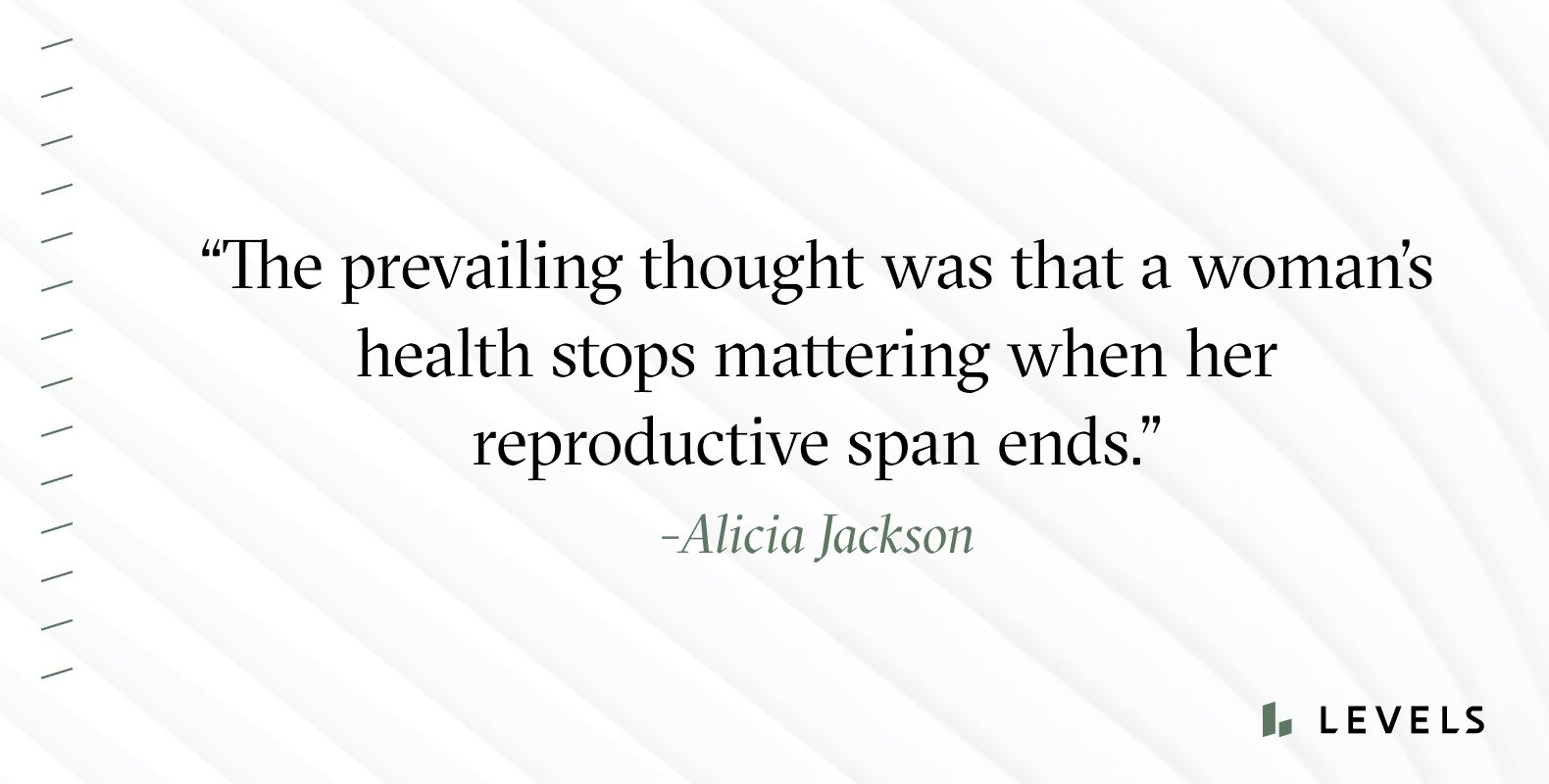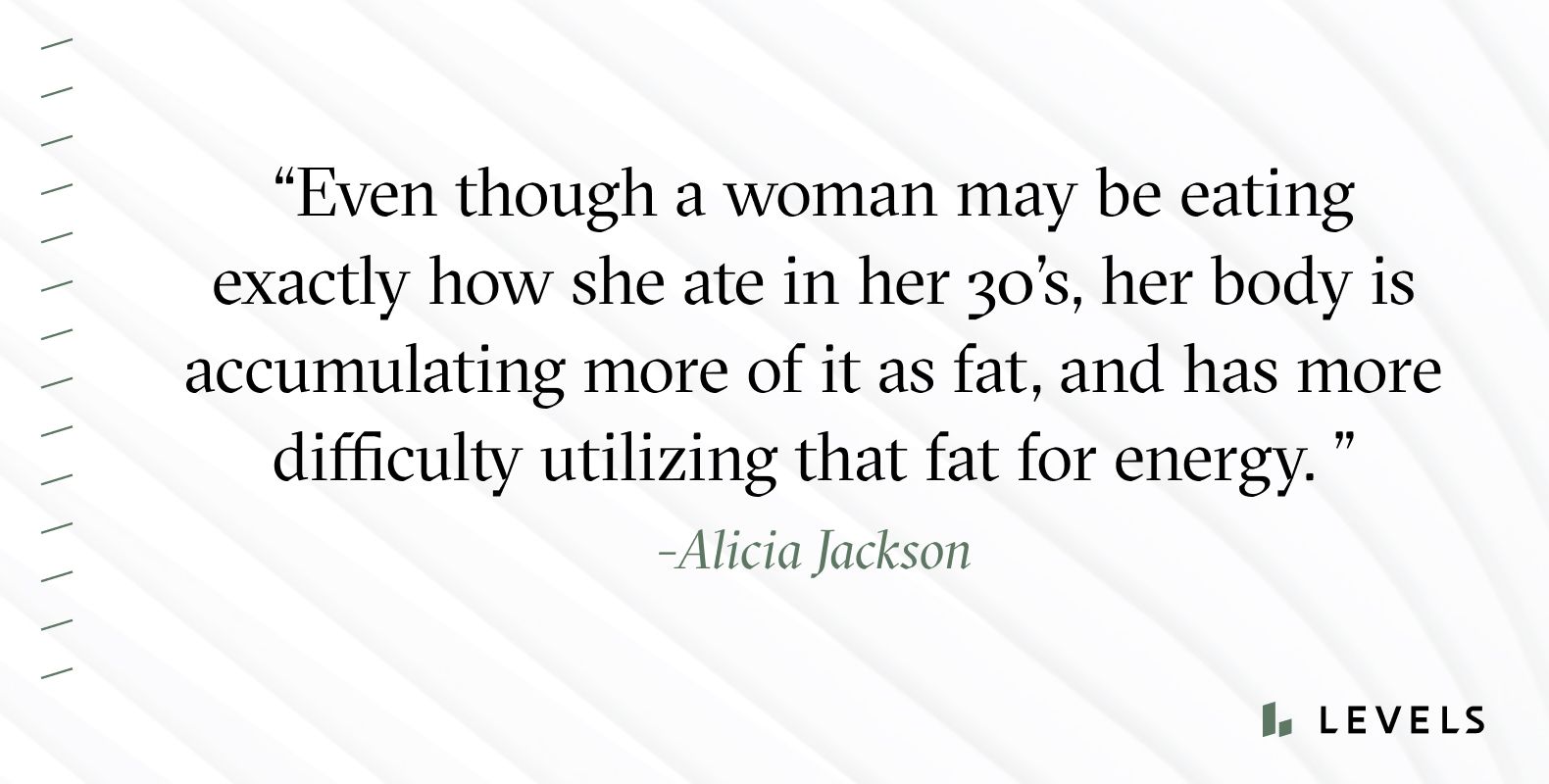
Alicia Jackson wants women to know that metabolic health matters during menopause
Metabolic health is linked to some life-altering symptoms during menopause. Here, the founder of Evernow shares what women can do about it.
The conversation about menopause has been hush-hush—to women’s detriment. Some doctors have traditionally been dismissive of symptoms while being ill-informed about the therapies available to treat hot flashes and night sweats, insomnia, mood changes, and more that are brought about by the hormonal shifts of menopause, which start in their 40s.
This is what inspired Alicia Jackson—an MIT-trained engineer who worked at DARPA before getting into health tech—to start Evernow. The company offers women guidance throughout perimenopause and menopause via telemedicine. In a recent conversation, she talks about why menopause deserves more of a platform, the necessary role of estrogen in a woman’s health, and how pharmacological treatments and dietary changes may help weight changes, glucose dysregulation, and insulin resistance.
You’ve got a fascinating background spanning research, work in government, and entrepreneurship. Tell me how you got to founding companies focused on women’s health.
After getting my Ph.D. from MIT—where I realized I did not want to be an academic—I went to work on Capitol Hill. Afterward, I had the opportunity to go to DARPA (Defense Advanced Research Projects Agency), work with the best researchers in the world, and control a budget of $300 million. There, I fell in love with entrepreneurship.
I also loved the intersection of consumer and healthcare. That said, Evernow is not the company I thought I would start. I began my research for what became Evernow, thinking I’d be building a fertility company because there was so much compelling cutting-edge science around ovarian aging.
But as I learned more about what happens as women enter perimenopause and menopause, I was struck by how profound the health changes are and how poorly supported women are medically during this time. That sent me on a journey toward understanding how menopause is this critical health transition in a woman’s life that makes a difference for how her health and life will play out not just in the short-term but also over the next 40 or 50 years.
Specifically, we tend to think of the symptoms of menopause as things like hot flashes and brain fog, but it’s also clear that menopause is a trigger for neurodegenerative diseases, diabetes, osteoporosis, and cardiovascular disease. If all of these factors are not managed correctly, a woman’s healthspan isn’t going to look that great. Nor will her lifespan. Compelling data shows that the age at which you go through menopause correlates with your longevity.

What did you see missing in the menopause space?
Menopause is something every woman will go through. And these changes can be treated with therapies that are both available and supported by great data.
As I was launching Evernow, I heard story after story of women going through menopause and feeling completely unprepared. Their physicians told them either: “Sorry, you’re just getting older” or “No, I’m not going to put you on hormonal therapy because it will give you cancer.” The prevailing thought was that a woman’s health stops mattering when her reproductive span ends.
Because this isn’t an aspect of health that’s emphasized in medical school or continuing education, many doctors also had such outdated understandings of hormonal therapies. Many are not skilled in understanding how to prescribe hormonal therapies, and they’re working off of old studies with incorrect information on the risks.
Overall, there was no care specifically focused on the rest of a woman’s life. I realized that there was a problem I needed to solve right now, which led to Evernow. I saw a real need for a company that could translate the best science into truly accessible care.

Do glucose levels in the brain drive hot flashes?
Research shows a relationship between the high blood sugar and hot flashes. Stabilizing glucose levels might help ease the discomfort.
How much awareness do you think there is around the breadth of the implications of the hormonal changes in menopause?
Next to none. The weight, brain, glucose, and insulin issues that women experience during this time of life are often attributed to aging, decreased physical activity, and diet. There is little discussion of the critical role that hormonal changes play.
Women are frequently most frustrated by—and some say is their greatest fear with menopause—weight gain. It comes out of nowhere for them. Despite dieting and working out like crazy, they’re still gaining weight. They know it’s linked to menopause, but the traditional medical establishment has told them that their metabolism is slowing because of aging—and they recommend a stricter diet and more exercise, which often fails to move the needle.
Here again, misinformation is to blame: Many widely circulated studies do a poor job separating data from women from men during the age spans when women are experiencing perimenopause and menopause. Yet research that focuses exclusively on women clearly shows there’s a connection. In the SWAN study—a National Institute of Health-funded study of women’s health during and after menopause—the rate of fat accumulation doubled during the menopausal transition.

Estrogen’s impact on insulin levels appears to be a significant driver behind many of these symptoms—particularly as it relates to fat storage and glucose processing. Can you talk about insulin’s role in menopause?
During the menopausal transition, a woman’s estrogen levels plummet to a fraction of what they were. Studies show a strong correlation between low estrogen and a shift in insulin regulation and metabolism, often manifesting as insulin resistance—meaning the pancreas pumps out more insulin than it did prior to menopause.
How quickly and where fat is stored and how easily fat is utilized as fuel is primarily controlled by insulin. Increased insulin production converts sugar into fat, and that insulin also drives fat storage. To make matters worse, insulin inhibits fat cells from exporting fat to be utilized.
In other words, even though a woman may be eating exactly how she ate in her 30’s, her body is accumulating more of it as fat, often unhealthy belly fat, and has more difficulty utilizing that fat for energy.
It’s the redistribution of fat and the accumulation of abdominal fat that’s so unhealthy for humans. But in positive news, it’s been shown that women who are given hormone therapy don’t experience the same weight changes and weight redistribution that women who do not have hormone therapy experience.

Dr. Sara Szal Gottfried on why metabolic health is not one-size-fits-all, especially for women
The legendary physician-scientist explains why women may struggle with keto, the hormones you're not thinking about, and why genetics aren't destiny
What do we know about the impact of hormone therapy during menopause on metabolic health?
We know that it helps. Clinical trials of estrogen replacement therapy in postmenopausal women have shown to be effective in lowering insulin resistance and reducing plasma glucose levels. This means that less fat is getting stored, and it’s easier to burn.
Many women also report that they’re able to control their weight better while on hormone therapy. As a bonus, they find that it helps improve their sleep, which can have a significant impact on metabolic health. The Women’s Health Initiative study—another landmark study—showed a decrease in diabetes if women were on hormone therapies. In other words, if you replace the hormones that are being lost, health improves.
There’s evidence that people who are overweight or have higher levels of insulin resistance have more severe menopausal symptoms. Can you speak to why this might be?
The traditional medical understanding of how fat accumulation affects menopause symptoms has been that people with a higher BMI will have fewer menopause symptoms because fat cells produce estrogen. However, we’ve found that the complete opposite happens.
We studied nearly 70,000 women through our Evernow Menopause Study, and our data does, in fact, show a strong correlation between BMI and symptom severity. This is true in many clinical studies as well.
In terms of why it might be happening, there isn’t one clear answer. Anecdotally, it’s reasonable to think that higher inflammation may be a factor. For hot flashes, some researchers hypothesize that extra adipose tissue makes it harder for people to stay cool. And if you’re overweight or obese, you often experience other health problems such as high cholesterol or high blood pressure, and there is evidence that these are tied to symptoms like hot flashes.
Aside from hormone therapy, what are some things women can do even as early as perimenopause to lessen the metabolic impact of these hormonal changes?
You’re not going to utilize carbohydrates like you once could, so you want to do anything that can put your body in fat-burning mode.
A low carbohydrate diet, including the keto and paleo diets, is one way to get there. Without carbohydrates to raise your insulin levels, your body won’t be driven to pack on the fat, and it will be able to utilize the fat that you’ve already stored.
Studies also show that intermittent fasting is particularly effective for decreasing insulin levels and helping your body utilize stored fat for fuel.
And lastly, the more muscle you have, the more fat you’ll burn even in a resting state, so weight training to build muscle mass is particularly helpful, and it helps with bone health as well.
Finally, you’ve been wearing a CGM. What has your experience been like?
I wear my CGM all the time. It’s impacted what and when I eat, and I’ve gained a deeper understanding of how to fuel my body for health.
I also practice intermittent fasting to help with my glucose regulation. Recently, I’ve tried IF where I’m only doing one meal, eaten past 6 or 7 PM. If I do several days of it, my glucose levels get better and more stable every day. It’s interesting how it takes time for your body to get more stable and bring down that average glucose level.
I’ve noticed that after some time of keeping my carbs restricted if I suddenly eat a carb-rich meal, my glucose will spike. One day, I was out with my team, and we went to a brewery. I ate a Banh Mi sandwich and drank a sour beer, and my blood sugar rose to around 180 mg/dL. The science is fascinating, and seeing it play out was incredible to watch. And I won’t be eating that meal any time soon again.

Take control of your metabolic health
Levels helps you see how food and lifestyle affect your health through macro tracking, habit-building, and customized insights and advice. Levels members can also incorporate biomarker data like real-time glucose and metabolic blood testing for an even more personalized experience. Click here to get started with Levels.




